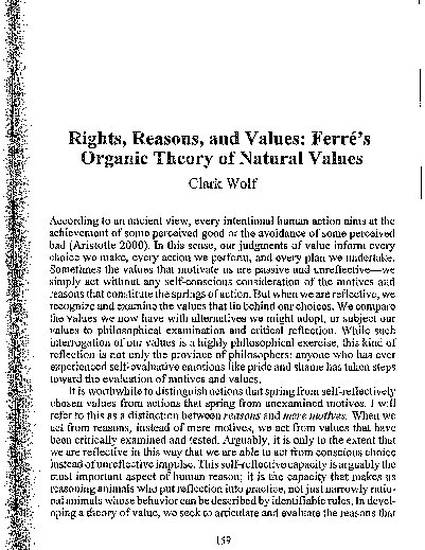
Contribution to Book
Rights, Reasons, and Values: Ferre's Organic Theory of Natural Values
Knowing, Living, and Being
(2005)
Abstract
According to an ancient view, every intentional human action aims at the
achievement of some perceived good or the avoidance of some perceived
bad (Aristotle 2000). In this sense, our judgments of value inform every
<!hoice we make, every action we perform, and every plan we undertake.
Sometimes the values that motivate us are passive and unreflective--we
simply act without any self-conscious consideration of the motives and
reasons that constitute the springs of action. But when we are reflective, we
recognize and examine the values that lie behind our choices. We compare
the values we now have with alternatives we might adopt, or subject our
values to philosophical examination and critical reflection. While such
interrogation of our values is a highly philosophical exercise, this kind of
reflection is not only the province of philosophers: anyone who has ever
experienced self-evaluative emotions like pride and shame has taken steps
toward the evaluation of motives and values.
Disciplines
Publication Date
2005
Editor
G. Allen and M. Allshouse
Publisher
Rowman & Littlefield
Publisher Statement
This is a chapter from Knowing, Living, and Being pp. 159-176, edited by G. Allen and M. Allshouse (2005), reproduced with permission of Rowman & Littlefield.
Citation Information
Clark Wolf. "Rights, Reasons, and Values: Ferre's Organic Theory of Natural Values" LexingtonKnowing, Living, and Being (2005) p. 159 - 176 Available at: http://works.bepress.com/clark-wolf/2/
